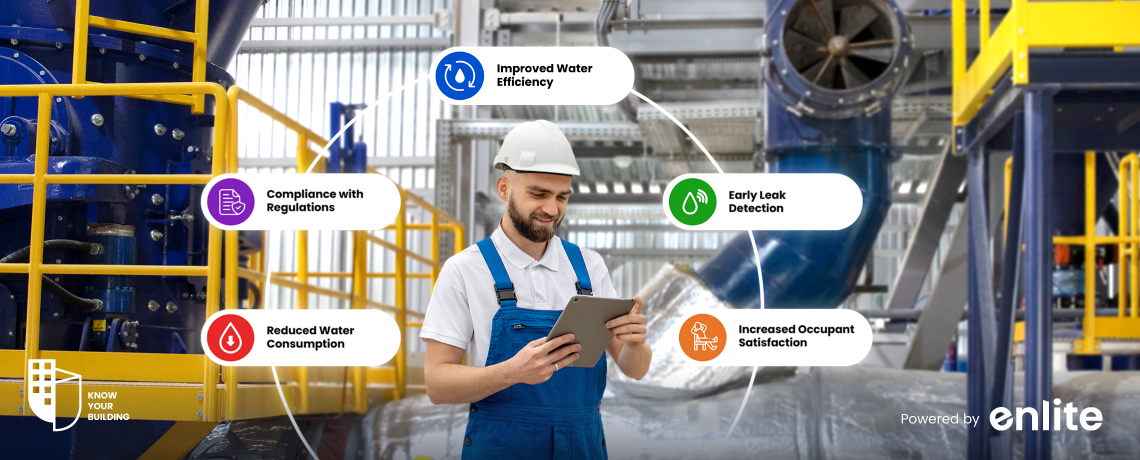Introduction
In today’s world of rising water scarcity and environmental awareness, building managers are facing greater pressure than ever to ensure water usage is responsible and efficient. That’s where water monitoring in a building management system (BMS) comes in as a game-changer. This powerful tool goes beyond basic water meters, offering real-time insights, data-driven decision-making, and significant benefits for both the building and its occupants.
What is Water Monitoring in a BMS?
Imagine a network of sensors and meters strategically placed throughout your building, keeping a watchful eye on every drop. Water monitoring in a BMS utilizes these sensors to track water usage at crucial points like water meters, submeters (specific areas like floors or apartments), and leak detectors. This data is then seamlessly integrated into your BMS, providing a comprehensive picture of your water consumption.
Why is Water Monitoring Important?
The benefits of water monitoring extend far beyond just cost savings on your water bills. It’s about embracing sustainability, protecting your building, and creating a healthier environment for your occupants. Here are some key reasons why water monitoring is crucial:
- Growing Water Scarcity and Sustainability Concerns: Water scarcity is becoming a global issue, and responsible water management is no longer a choice, but a necessity. Monitoring helps you identify and address water waste, contributing to a more sustainable future.
- Rising Water Costs and Impact on Operations: Water bills can be a significant expense for building owners. Water monitoring empowers you to optimize water usage, leading to cost reductions and improved operational efficiency.
- Regulatory Requirements and Compliance: Many regions have regulations mandating water usage reporting. Water monitoring equips you with the data needed to comply with these regulations and avoid potential penalties.
Top Benefits of Water Monitoring
Now, let’s delve into the tangible benefits water monitoring offers:
1. Reduced Water Consumption:
- Identify areas of excessive water usage, such as leaky faucets, inefficient appliances, or overwatering landscapes.
- Make data-driven decisions about implementing water conservation strategies like low-flow fixtures, smart irrigation systems, and occupant awareness campaigns.
- Track progress towards water reduction goals and celebrate your achievements.
2. Early Leak Detection:
- Receive real-time alerts for leaks, pinpoint their location, and minimize damage before it escalates.
- Save money on expensive repairs and prevent potential property damage.
- Ensure the safety and well-being of your building’s occupants.
3. Improved Water Efficiency:
- Optimize water usage in specific areas like HVAC systems, appliances, and plumbing fixtures.
- Identify opportunities for water reuse and recycling, reducing overall consumption.
- Implement smart irrigation systems and water-saving technologies for sustainable landscaping.
4. Compliance with Regulations:
- Meet local water reporting requirements with accurate and readily available data.
- Demonstrate your commitment to responsible water management and sustainable building practices.
- Potentially qualify for incentives and rebates offered by water authorities for adopting water-saving measures.
5. Increased Occupant Satisfaction:
- Enhance transparency by informing occupants about your water conservation efforts and progress.
- Build trust and goodwill by demonstrating a commitment to environmental responsibility.
- Contribute to a healthier and safer building environment through leak detection and water quality monitoring.
How to Get Started with Water Monitoring
Implementing water monitoring doesn’t have to be daunting. Here’s a step-by-step guide:
- Identify your goals: Define your water reduction targets, budget, and how water monitoring aligns with your overall sustainability strategy.
- Choose the right sensors and meters: Consider compatibility with your BMS, accuracy, reliability, and cost-effectiveness.
- Install the sensors and meters: Seek professional help to ensure proper placement and minimize disruption.
- Connect the sensors and meters to your BMS: Configure data transmission protocols and set up visualization dashboards.
- Start monitoring your water usage: Analyze data, set up alerts for anomalies, and continuously optimize your water management strategies.














